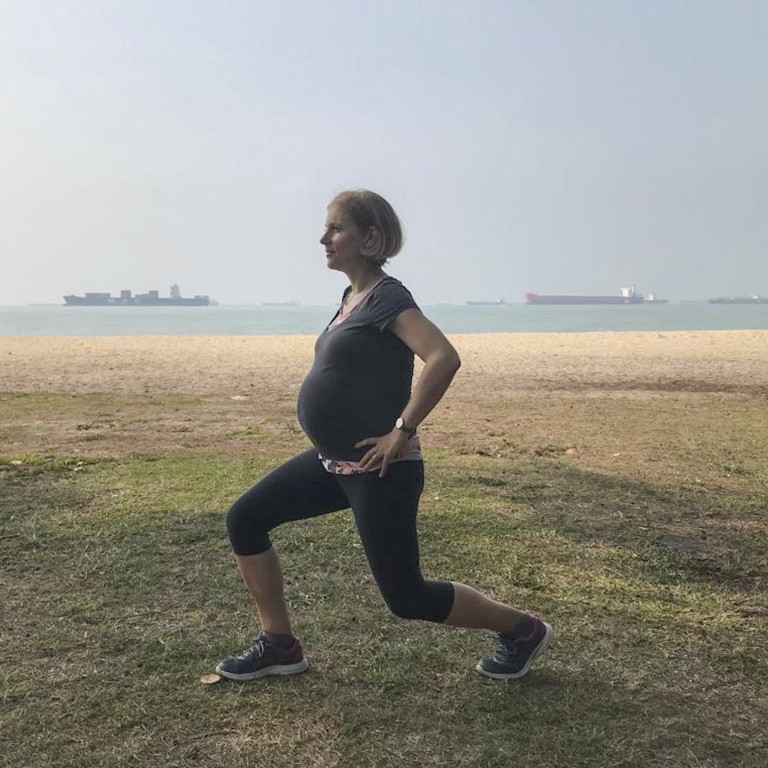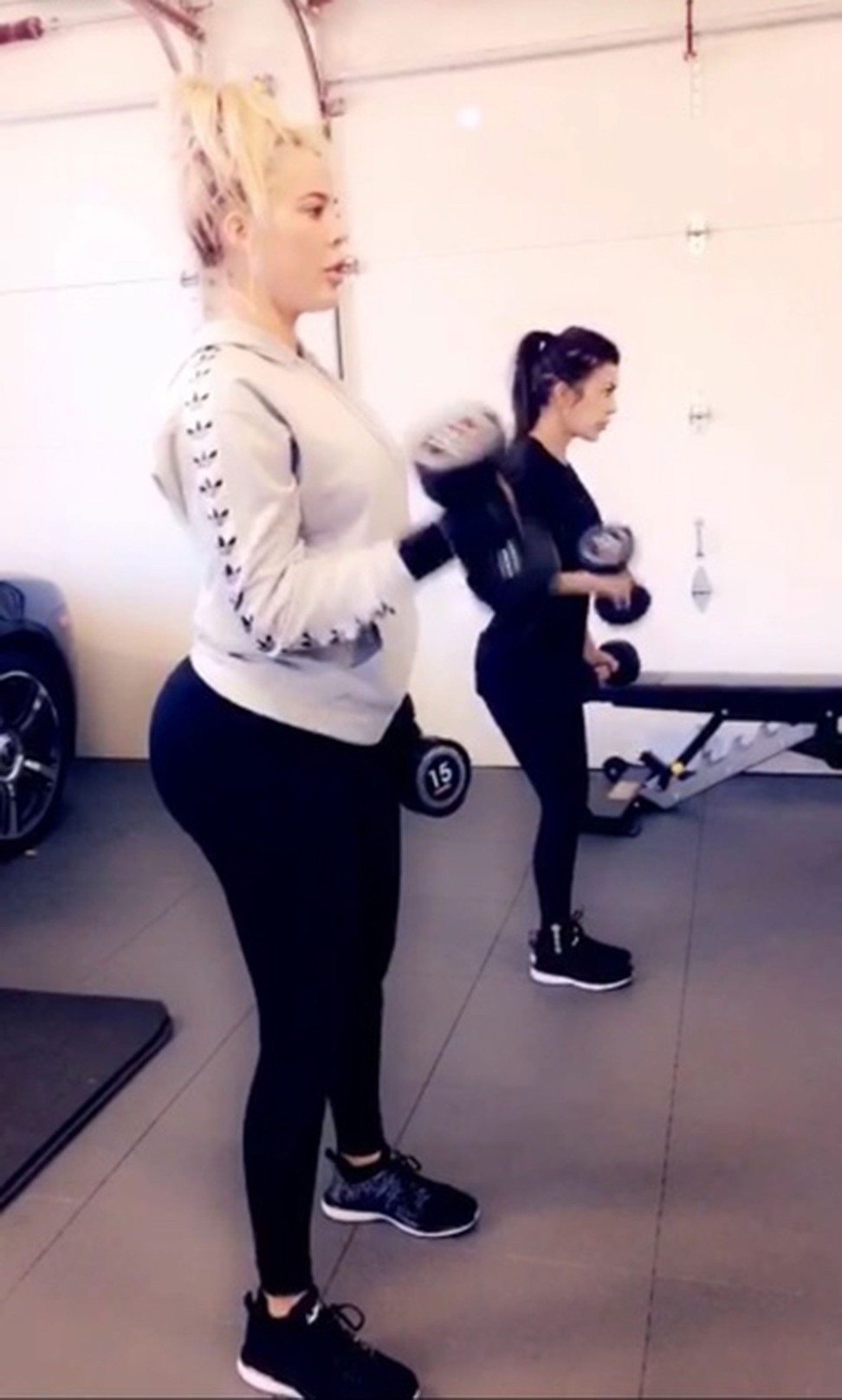
How baby and mother can benefit from pregnancy workouts, as long as you follow doctor’s orders
- Khloe Kardashian and Serena Williams famously worked out while pregnant, and studies suggest it improves baby’s neuromotor skills
- A physiotherapist advises consulting a doctor if mothers didn’t exercise before pregnancy or have existing medical conditions
Cassandra Humphreys may be in her final trimester of pregnancy – her second son is due in November – but the mum-to-be still makes it a point to be physically active.
Twice a week she goes to prenatal boot-camp classes, and on other days she goes for brisk walks, takes the stairs to her office instead of the lift, and does squats and arm exercises with a resistance band. Her four-year-old son keeps her moving, too; Humphreys swims and cycles with him as often as she can.
The Singapore resident, who is originally from the UK, was also active during the first two trimesters, although in her first, frequent bouts of nausea limited her workouts to walks and swims.

“I exercised during my first pregnancy, too, and really felt the benefits, so I wanted to do the same the second time around,” says Humphreys, who recently turned 40. “I find that it gives me energy but also relaxes me, plus it’s a great way to prepare my body and mind for birth and new motherhood.”
Staying physically active during pregnancy is said to reduce backache and constipation, improve posture, mood and sleep quality, and promote strength and endurance, but women who exercise while pregnant aren’t just helping themselves – a recent study found that exercise has lasting benefits for their babies, too.
Researchers at East Carolina University in the United States tested one-month-old babies using the standard paediatric assessment of neuromotor skills. They found that babies whose mothers got regular aerobic exercise during pregnancy were more adept at movement than babies whose mothers did not get regular aerobic exercise.
The women in the exercise group performed 50 minutes of supervised moderate-intensity aerobic exercise, three times a week, while the women in the control group maintained usual activity. Researchers wrote that the babies in the first group were more likely to be active because their neuromotor skills were more developed.
Their findings suggest that exercise during pregnancy may potentially reduce childhood risk of obesity. The results were published in the August 2019 issue of the journal, Medicine & Science in Sports & Exercise.

But those aren’t the only benefits of maternal exercise for babies. According to a study published in 2014 in the journal Obstetrics & Gynaecology, women who exercised during their third trimester gave birth to babies with less body fat. Another study, by researchers at Kansas City University of Medicine and Biosciences in the United States, found that exposure to maternal exercise boosted fetuses’ cardiovascular health and the effect continued even after they were born.
Dr Patrick Chan Sai-lock, a specialist in obstetrics and gynaecology at Matilda International Hospital in Hong Kong, says that while we have some evidence that exercise can improve an infant’s neuromotor development, more studies are needed to support the research. He believes that exercising during pregnancy has benefits, but advises mums-to-be to consult their doctor before beginning any exercise routine.
How intense should your workouts be? At the moment, it is hard to say what constitutes a safe upper limit, says Norma Ngai Tse-wai, a physiotherapist at Matilda International Hospital.

“Intensity is based on the individual’s level of physical ability, but, according to the American College of Obstetricians and Gynaecologists, mums-to-be can exercise for 30 minutes a day, five to seven days a week,” says Ngai. “If you exercised regularly before you fell pregnant you can continue your exercise routine, but you need to be aware of warning signs, such as vaginal bleeding, painful contractions, amniotic fluid leakage, dizziness, chest pain, and calf pain or swelling.”
If you experience any of these issues, you should stop exercising and consult your doctor.
If you did not exercise regularly before you became pregnant, Ngai suggests starting with low-intensity exercise, like 10 minutes of casual to brisk walking, and stepping it up gradually.
Ngai recommends exercising in an environment with a suitable temperature and humidity level and says to pay attention to potential problems like dehydration and heat stress. Because of the risks they pose to the health of a pregnant woman and her unborn baby, you should avoid contact sports, exercises with a high risk of falls, scuba diving, hot yoga and hot Pilates.

What are the best exercises to do during each trimester? During the first trimester, most mums-to-be have some pregnancy-related discomfort such as tiredness or morning sickness. In this case, Ngai says that they might want to do gentle aerobic and strengthening exercises. In the second trimester, most pregnant women usually feel better and are able to do aerobic exercises, yoga and modified Pilates.
During the final trimester, many mums-to-be may experience shortness of breath and start to get fatigued more easily. Ngai recommends doing less aerobic exercise and to try gentle stretching, breathing and pelvic floor exercises to help prepare for labour.

Humphreys suggests working with trainers who understand pregnancy and who know how to modify exercises to suit your changing shape. The more comfortable you feel, the easier it will be to stick to your routine and the more confident you will feel as you progress through all three trimesters.
So far during her pregnancy, Humphreys has followed general medical advice to listen to her body, keep hydrated, avoid overheating, stay comfortable, and go easy on herself rather than pushing too far or too hard.

